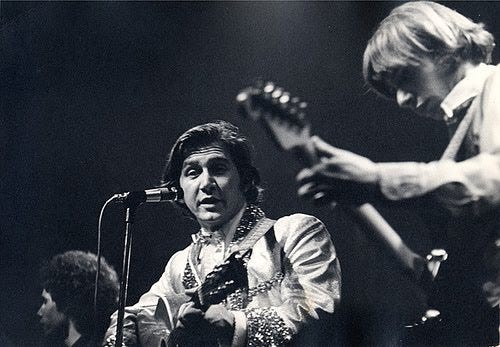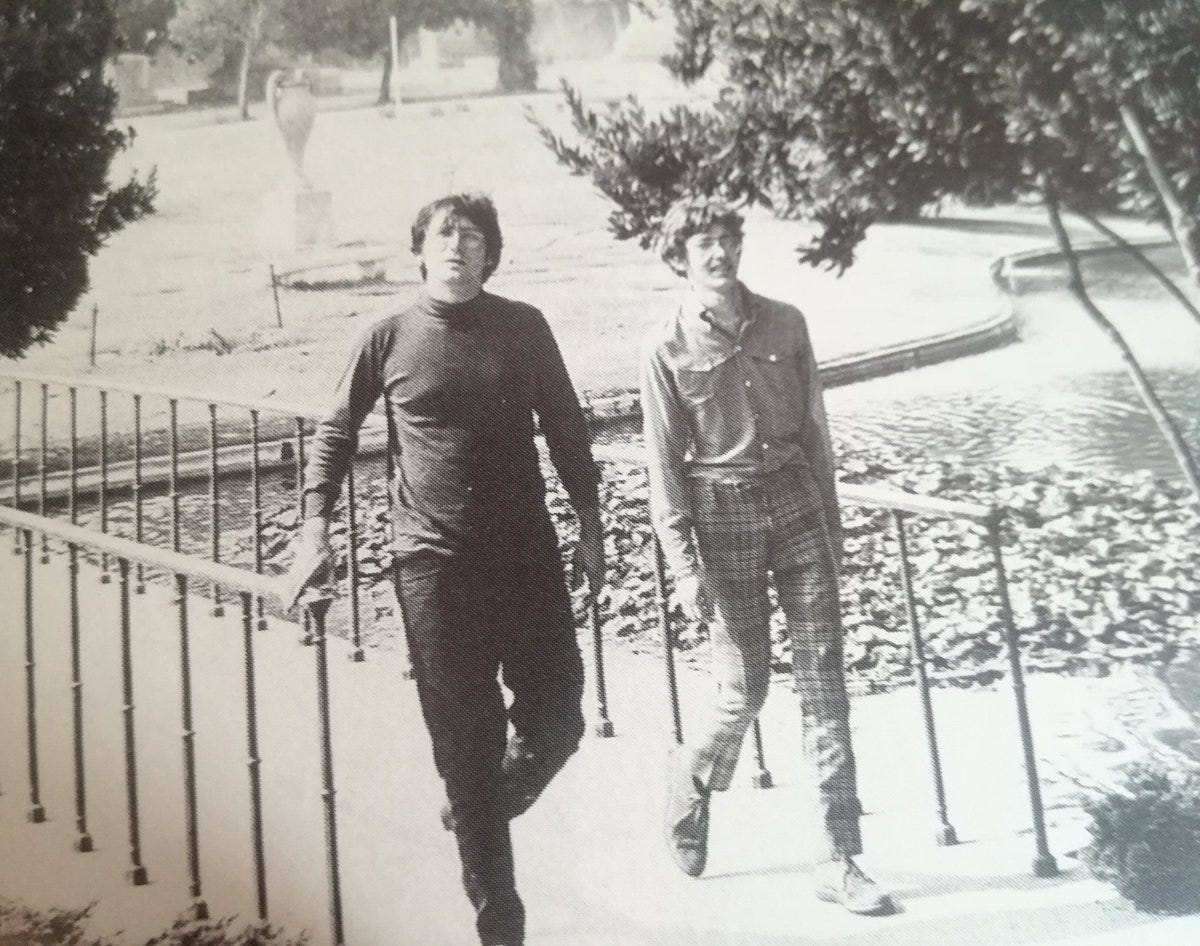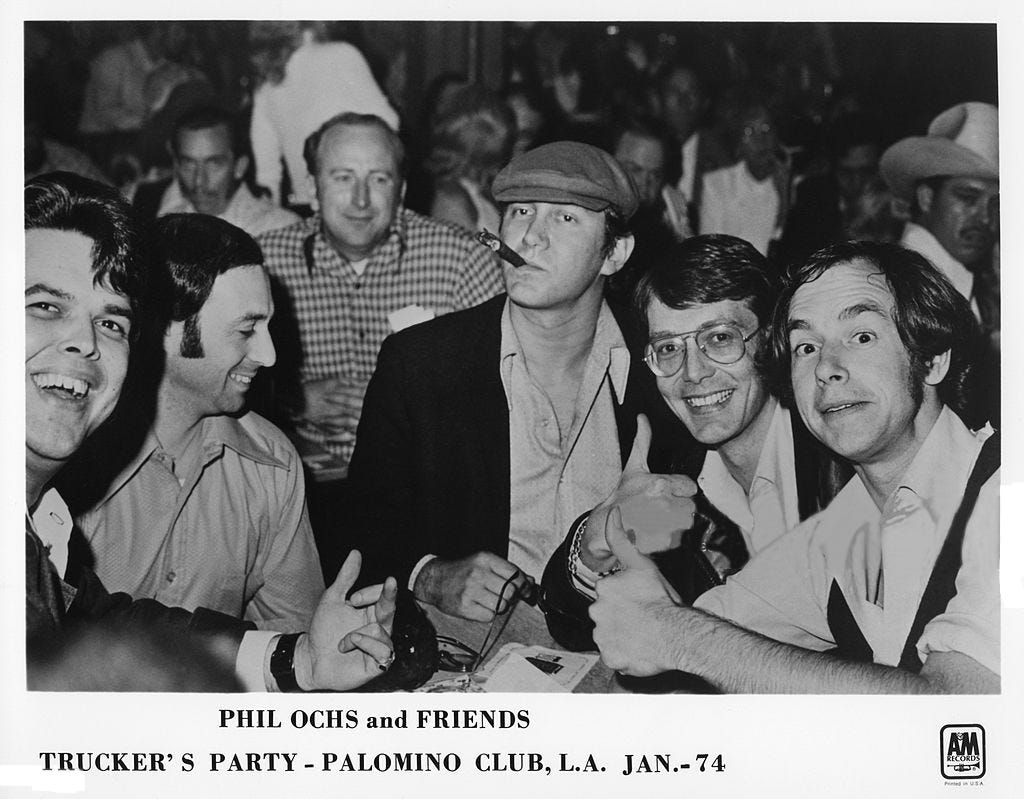For some Angelenos, it’s a bragging point to say you have lived in LA and New York City. It suggests wordiness and a certain amount of toughness, as making it in both places requires resilience, luck, and money.
Phil Ochs was no different. Born in El Paso, Texas, he moved around a lot as a kid due to his father’s work situation. He lived in Far Rockaway, New York, Perrysburg in the western part of New York, not far from Lake Erie, close enough to experience lake-effect snowfall before settling in Columbus, Ohio.
During those early years, two major influences on Ochs were movies and music. While living in Far Rockaway, he and his younger brother Michael spent much time at the movies. Some of his favorite actors included John Wayne and James Dean.
Of the former, Ochs said the following before a performance of a song called “Pleasures of the Harbor” in Vancouver in 1968.
“One of the most exciting things about the twentieth-century and one of the most lyrical forms you'd find now, is movies. In varying stages I was a, I was always a John Wayne fan when I was very young I think uh—That's one of the dilemmas we have one of the dilemmas that America presents is that many of America's greatest, truly greatest artists are very right-wing and reactionary and not particularly intelligent. But they're still great, they're truly great in their own mediums. I think John Wayne is one of the greatest men ever to step in front of a screen. The John Wayne / John Ford combination was really very lyrical. They made a lot, all the calvary movies and they also made some O'Neill stuff, some Irish, Eugene O'Neill plays. They made a movie called The Long Voyage Home. Which I saw when I was about three or something This song came from that movie, ultimately, subconsciously. It’s called "Pleasures of the Harbor,” which I'll dedicate to John Ford and John Wayne. Nobody takes, nobody can take you seriously these days.”
Ochs wrote a song about Dean called “Jim Dean of Indiana” that was released on his final studio album, Greatest Hits. The song tells of Dean’s upbringing, career, and untimely death. Ochs played it continuously on the piano in his sister’s home in Far Rockaway in his last days before he took his life in April 1976 at the age of 35.
Ochs played clarinet as a teenager and was talented enough to play with the Capital University Conservatory of Music. Though initially interested in classical music, he developed a love for Buddy Holly, Elvis Presley, Faron Young, Hank Williams, Johnny Cash, and Ernest Tubb. Holly and Presley especially left an impression on him that impacted the last part of his career.
After attending Staunton Military Academy in Virginia, Ochs began attending The Ohio State University, where he studied journalism and became interested in politics. He was introduced to folk music and began playing guitar and writing newspaper articles. Eventually, he started his own newspaper after the student paper declined to publish some of his pieces due to their radical politics.
He dropped out of OSU his senior year and moved to New York City to become a folk singer.
He got involved in the thriving folk scene in NYC, playing at Hootenannies and in folk festivals like Newport. During this period, he developed an amicable rivalry with Bob Dylan. “I just can't keep up with Phil. And he just keeps getting better and better and better,” said Dylan in the November 27, 1965 issue of Melody Maker.
Their relationship became strained when Ochs had a lukewarm response to “Can You Please Crawl Out Your Window?” Dylan reportedly said, “You’re not a folksinger, you’re a journalist.” There was some truth to that as Ochs was writing mostly topical songs during that period; the more abstract stuff would come later with a move to a new label and a new city: Los Angeles.
Ochs relocated to the City of Angels in 1967 and moved from Elektra Records to A&M, a label for which he released four albums: Pleasures of the Harbor, Tape from California, Rehearsals for Retirement, and Greatest Hits. These four albums marked a shift in style, embracing more elaborate productions and a more introspective approach to the lyrics. However, there were still plenty of topical songs, particularly his penultimate studio album, which featured a tombstone noting that he had died in Chicago after the 1968 Democratic National Convention. Ochs was there to see firsthand how the Chicago Police Department beat and teargassed demonstrators.
Ochs wrote a song about his new home, “The World Began in Eden and Ended in Los Angeles,” and had this to say about the city in an introduction before a live performance at the same Vancouver show.
“This next song is, uh, is my apology for moving to Los Angeles, which intrigues me like a beautiful sensual morgue. I think, I think the final, the final irony is that uh, the history of Western man, when you consider the history of Western man and the Renaissance and, and everything else, it led up—The final story, the final chapter of Western man, I believe lies in Los Angeles. That’s where it ended up. It’s true. Everybody kept moving, everybody kept leaving. They left England to come here and they kept moving west to colonize and colonize. Now this, every day thousands of people arrive in Los Angeles to find the answer and they're gonna find the answer.”
Ochs made a change in direction in the 70s; he returned to the country music and early rock and roll he had loved as a boy and began wearing a gold lamé suit designed by tailor Nudie Cohn, famed for his elaborate rhinestone-covered suits worn by country singers.
“And if there's any hope for this, for America, it lies in a revolution. And if there's any hope for a revolution in America, it lies in getting Elvis Presley to become Che Guevara,” said Ochs at a performance that became part of a live album: Gunfight at Carnegie Hall. The title and the artwork reflected Ochs’ love of Westerns.
Ochs love for movies influenced his songwriting. He described some of his songs as cinematic, such as “Ringing of Revolution,”
“As a matter of fact, this song is so cinematic that it’s been made into a movie directed by Otto Preminger. It stars Senator Carl Hayden as Ho Chi Minh. Frank Sinatra plays Fidel Castro. Ronald Reagan plays George Murphy. John Wayne plays Lyndon Johnson and Lyndon Johnson plays God. I play Bobby Dylan, a young Bobby Dylan,” said Ochs in his introduction to the song on the album Phil Ochs in Concert.
The 70s were a difficult time for Ochs; he struggled with substance abuse issues, poor mental health, and a series of disasters. Biographer Michael Schumacher, author of There But For Fortune: The Life of Phil Ochs, suggested the reasons why Ochs ultimately took his own life.
“By Phil's thinking, he had died a long time ago: he had died politically in Chicago in 1968 in the violence of the Democratic National Convention; he had died professionally in Africa a few years later when he had been strangled and felt that he could no longer sing; he had died spiritually when Chile had been overthrown and his friend Victor Jara had been brutally murdered; and, finally, he had died psychologically at the hands of John Train.”
John Butler Train was the result of dissociative identity disorder. Ochs was convinced that he had been replaced Ochs after murdering him, and now there were people after Train. Eventually, the Ochs persona returned, but he spoke of suicide still.
Penniless and broken, Ochs left Los Angeles to move in with his sister, Sonny. He spent his time playing cards with his nephews and was prescribed medication for bipolar disorder, an ailment his own father suffered from, which factored in their relocations during the early part of his life. Ultimately, he hung himself on April 9, 1976, when he was just 35. A tragic ending straight out of a Hollywood tearjerker.
Though he is gone, his legacy lives on in his words and music. Phil Ochs is with us still.







